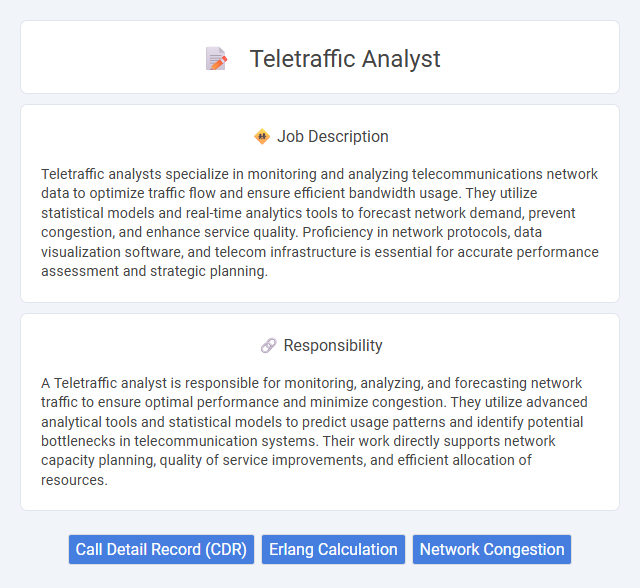
Teletraffic analysts specialize in monitoring and analyzing telecommunications network data to optimize traffic flow and ensure efficient bandwidth usage. They utilize statistical models and real-time analytics tools to forecast network demand, prevent congestion, and enhance service quality. Proficiency in network protocols, data visualization software, and telecom infrastructure is essential for accurate performance assessment and strategic planning.
People with strong analytical skills and a keen interest in telecommunications data are likely to thrive as teletraffic analysts. Those comfortable with statistical software and capable of interpreting complex traffic patterns may find this role suits their abilities. Individuals who prefer structured, data-driven environments and enjoy problem-solving under time constraints are probably well-suited for this job.
Qualification
A Teletraffic Analyst must possess a strong background in telecommunications engineering or computer science, often requiring a bachelor's degree in these fields. Proficiency in statistical analysis, traffic modeling, and experience with network simulation tools such as OPNET or NS2 is essential. Expertise in data analytics, problem-solving skills, and knowledge of telecommunication protocols greatly enhance the ability to optimize network performance and forecast traffic loads accurately.
Responsibility
A Teletraffic analyst is responsible for monitoring, analyzing, and forecasting network traffic to ensure optimal performance and minimize congestion. They utilize advanced analytical tools and statistical models to predict usage patterns and identify potential bottlenecks in telecommunication systems. Their work directly supports network capacity planning, quality of service improvements, and efficient allocation of resources.
Benefit
A Teletraffic analyst likely helps optimize network performance by predicting and managing data traffic, which may reduce downtime and improve service quality. Employers could benefit from increased efficiency and cost savings by minimizing congestion and capacity issues. Career prospects might include opportunities in telecommunications firms, IT companies, and network infrastructure providers due to growing demand for data traffic management.
Challenge
Teletraffic analyst roles likely involve the challenge of managing and predicting network traffic to prevent congestion and ensure optimal performance. Accurate data analysis and modeling may be required to forecast peak usage periods and avoid service disruptions. This position probably demands adaptability to rapidly changing network conditions and evolving technology trends.
Career Advancement
Teletraffic analysts specialize in monitoring and managing data traffic within telecommunications networks to optimize performance and prevent congestion. This role offers significant career advancement opportunities, including progression to senior network analyst, telecommunications engineer, or systems architect positions. Expertise in network modeling, data analysis, and emerging technologies like 5G enhances prospects for leadership roles and specialized consultancy.
Key Terms
Call Detail Record (CDR)
A Teletraffic Analyst specializing in Call Detail Record (CDR) analysis extracts and interprets vast datasets to monitor and optimize telecommunications network performance. By examining call duration, routing information, and usage patterns, they identify traffic bottlenecks and enhance service quality. Expertise in CDR data mining enables predictive modeling for capacity planning and fraud detection in telecom infrastructures.
Erlang Calculation
Teletraffic analysts specialize in applying Erlang calculations to optimize network traffic and ensure efficient telecommunications capacity planning. They use Erlang B and Erlang C formulas to predict call congestion and grade of service, enabling accurate dimensioning of switches and circuits. Mastery of these mathematical models supports minimizing call blocking and delays, directly improving network performance and customer satisfaction.
Network Congestion
Teletraffic analysts specialize in monitoring and managing network congestion by analyzing data traffic patterns to optimize bandwidth allocation and ensure efficient network performance. They utilize advanced modeling techniques and real-time analytics tools to predict peak usage times and prevent bottlenecks, reducing latency and packet loss. Their expertise is critical in maintaining Quality of Service (QoS) in telecom networks, supporting uninterrupted communication and data transfer.
 kuljobs.com
kuljobs.com